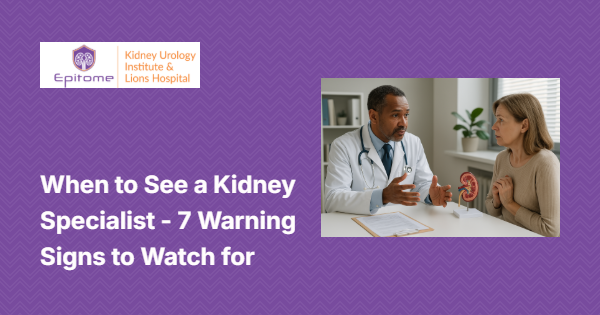Highlighting the significant burden of kidney disease in India, an Indian nephrologist reports that roughly 10% of the population lives with chronic kidney disease (CKD), and over one lakh individuals develop renal failure every year. Kidney disease becomes dangerous because it shows no early symptoms. Your kidneys can lose much of their function before any warning signs show up.
Your kidneys never rest. They filter 180 liters of blood daily and create waste that becomes urine. Kidney disease sneaks up on people because its early stages often have no clear signs. People might feel tired or notice changes in their urine. Some get swelling or high blood pressure. These symptoms can look like other health problems. Seeing a kidney specialist is a vital step to protect your health, especially when you have risk factors like diabetes, high blood pressure, or kidney disease in your family.
7 Warning Signs of Kidney Disease You Shouldn't Ignore
Kidney disease sneaks up on people until it causes a lot of damage. Medical experts say many patients don’t realize they have kidney disease until it reaches an advanced stage. You could avoid kidney failure and save your life by spotting these warning signs early.
1. Severe flank pain requiring immediate attention
Your side or lower back pain could point to kidney problems. Kidney pain feels different from regular back pain – it sits deeper under your ribs on either side of your spine. Kidney stones can cause sharp, crampy pain that moves in waves toward your groin. Each wave of pain lasts 20-60 minutes and might make you feel sick or throw up. You should head to the Best Kidney Hospital in Delhi right away if you notice severe pain along with blood in your urine.
2. Changes in Urination
Your urine gives early clues about kidney stone problem. Look out for urine that looks foamy like beer foam – this might mean your kidneys are leaking too much protein. Your kidneys might not be filtering well if your urine turns dark amber, brown, or reddish. Pay attention to how often you need to go and if you’re having trouble urinating.
3. Dangerous electrolyte imbalance signs
Failing kidneys can’t keep your blood’s electrolytes in check. This throws off your body’s balance and can lead to confusion, irregular heartbeats, weak muscles, cramps, and numb limbs. Things can get really serious with seizures or sudden cardiac death. People with kidney disease often develop hyperkalemia (high potassium) and hyponatremia (low sodium).
4. Nausea, Vomiting, and Difficulty Concentrating
These signs show up as kidney disease gets worse. About 30-40% of chronic kidney disease patients feel sick to their stomach and throw up. This happens because toxins build up in your blood when your kidneys can’t filter properly. You might notice a metallic taste in your mouth too.
5. Unexplained fatigue and brain fog
Fatigue hits 50-60% of advanced kidney disease patients and almost all dialysis patients (up to 97%). Your risk of cognitive problems goes up by a lot with kidney disease. Memory issues, poor concentration, and confusion become common. Your kidneys stop making enough erythropoietin – the hormone that tells your body to produce oxygen-carrying red blood cells and hence causes Anemia.
6. Skin changes and itchiness and Persistent Swelling (Edema)
Severe itching (pruritus) bothers many kidney patients, affecting up to 70% of people on hemodialysis. Your body starts holding onto fluid, which makes your legs, ankles, hands, or face swell. Pressing on these swollen areas might leave a dimple or “pit.” The Chronic Kidney Disease Specialist in Delhi at Epitome Hospitals will do complete evaluation of these symptoms to plan your treatment.
7. Poor appetite and metallic taste
Changes in appetite or a metallic taste in your mouth could indicate advancing kidney disease. As kidney function declines, waste buildup (uremia) alters taste perception, making food taste metallic or bitter. This condition can also cause bad breath and reduce appetite.
Appetite loss is common in kidney patients, with one-third of dialysis patients reporting poor appetite, which is linked to worse health outcomes. The causes include:
- Uremic toxins and inflammatory cytokines buildup
- Gut microbiota changes and hormonal imbalances
- Hypothalamic dysfunction, affecting hunger signals
- Elevated parathyroid hormone (PTH) levels
High-Risk Groups Who Should See a Kidney Specialist Regularly
Some groups have high risks of getting kidney disease and should think about regular visits with a nephrologist. Your kidney function can last many years longer when specialists catch problems early and slow down any damage.
Diabetes and hypertension patients
Diabetes is the leading cause of kidney disease. Approximately 1 in 3 adults with diabetes has chronic kidney disease (CKD). Your kidneys get damaged when high blood sugar hurts blood vessels and nephrons, which makes it hard for them to filter properly and an early sign is leading albumin/protein in urine which can be assessed by a simple urine test.
High blood pressure threatens your kidney health, with approximately 1 in 5 adults with high blood pressure having CKD. Your blood vessels narrow throughout your body when blood pressure stays high, including the ones in your kidneys. These damaged vessels don’t remove wastes and extra fluid well. This creates a dangerous cycle because the extra fluid makes your blood pressure go even higher.
Family history of kidney disease
Kidney problems often show up in multiple family members. Your risk goes up if your close relative (parent, grandparent, or sibling) has kidney disease. Your genes play a big part in certain kidney conditions, which makes your family’s health history crucial to preventing kidney disease.
The Best Kidney Hospital in Delhi helps families learn about their inherited risks through genetic counseling and testing. A family history doesn’t mean you’ll definitely get kidney disease – it just means you need to be extra careful about checkups.
Recurrent kidney stone sufferers
Previous kidney stones mean you could get them again. These conditions raise your risk of getting more kidney stones. As well as Kidney disease, it is important to get assessed for risk factors for kidney stone and adjust diet and fluid intake to lower the risk of future Kidney Stones. Meet with the best Kidney specialist treatment at Chronic Kidney Treatment in Delhi centers can help control these conditions and stop stones from coming back.
Seeking Care at Epitome Hospitals – The Best Kidney Disease Hospital in Delhi
Finding the right kidney specialist becomes vital after you notice potential kidney disease symptoms. A qualified nephrologist at the Best Kidney Hospital in Delhi can make the most important difference in your treatment outcomes.
Epitome Hospitals stands out as the Best Kidney Disease Hospital in Delhi, offering advanced treatments for all kidney conditions. Whether you need expert management for chronic kidney disease (CKD), dialysis services, or a kidney transplant, Epitome Hospitals provides world-class care. Their team includes the Best Kidney Specialists in Delhi, ensuring personalized treatment plans to slow kidney disease progression and improve outcomes.
Questions to ask during your consultation
You should prepare specific questions before meeting your specialist to make the most of your consultation time:
- About your condition: “What is my GFR level and what does it mean?” “Is my kidney disease getting worse?” “Will I need dialysis or a transplant soon?”
- About treatment options: “What can I do to slow or reverse my kidney function decline?” “Do any of my medications need adjustment?” “What treatment options are available and what are their side effects?”
- About lifestyle changes: “Should I modify my diet?” “What foods have the right amount of protein, salt, potassium, and phosphorous for my condition?”
Conclusion
Kidney disease often progresses silently, making early detection essential. Symptoms like changes in urination, fatigue, and swelling should never be ignored. If you have diabetes, high blood pressure, or a family history of kidney disease, regular checkups with a Kidney Specialist in Delhi NCR can prevent complications.
For advanced kidney care, Epitome Hospitals offers specialized treatments, including high-success-rate kidney transplants, earning its reputation as the Best Kidney Transplant Hospital in Delhi. Book a consultation with the Best Kidney Specialist at Epitome Hospital in Delhi today to safeguard your kidney health.
FAQs
Q1. When should I consult a kidney specialist?
You should see a kidney specialist if you experience persistent symptoms such as high blood pressure, swelling in your legs or feet, puffiness around your eyes, and unexplained fatigue. Additionally, if you have risk factors like diabetes, hypertension, or a family history of kidney disease, regular check-ups with a nephrologist are recommended.
Q2. What are the early warning signs of kidney disease?
Early warning signs of kidney disease include changes in urination patterns, unexplained fatigue, poor appetite, swollen ankles or feet, and itchy skin. You may also notice foamy urine, increased nighttime urination, or difficulty sleeping. If you experience these symptoms, it’s important to consult a healthcare professional.
Q3. How can I identify serious kidney problems?
Serious kidney problems may manifest as severe flank pain, nausea and vomiting, muscle cramps, significant changes in urine output, and shortness of breath. Other alarming signs include persistent swelling, confusion, and a metallic taste in your mouth. If you experience these symptoms, seek immediate medical attention.

